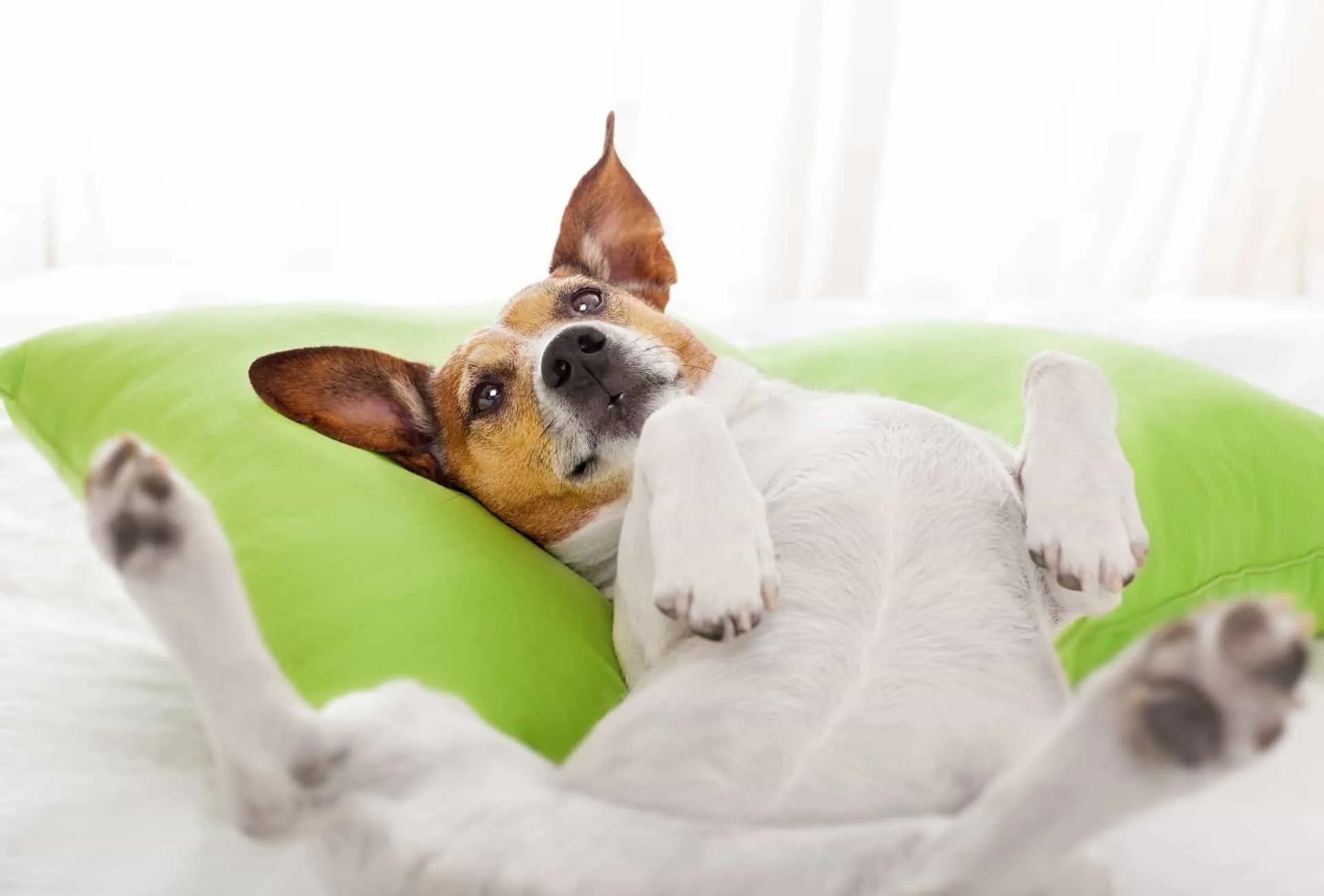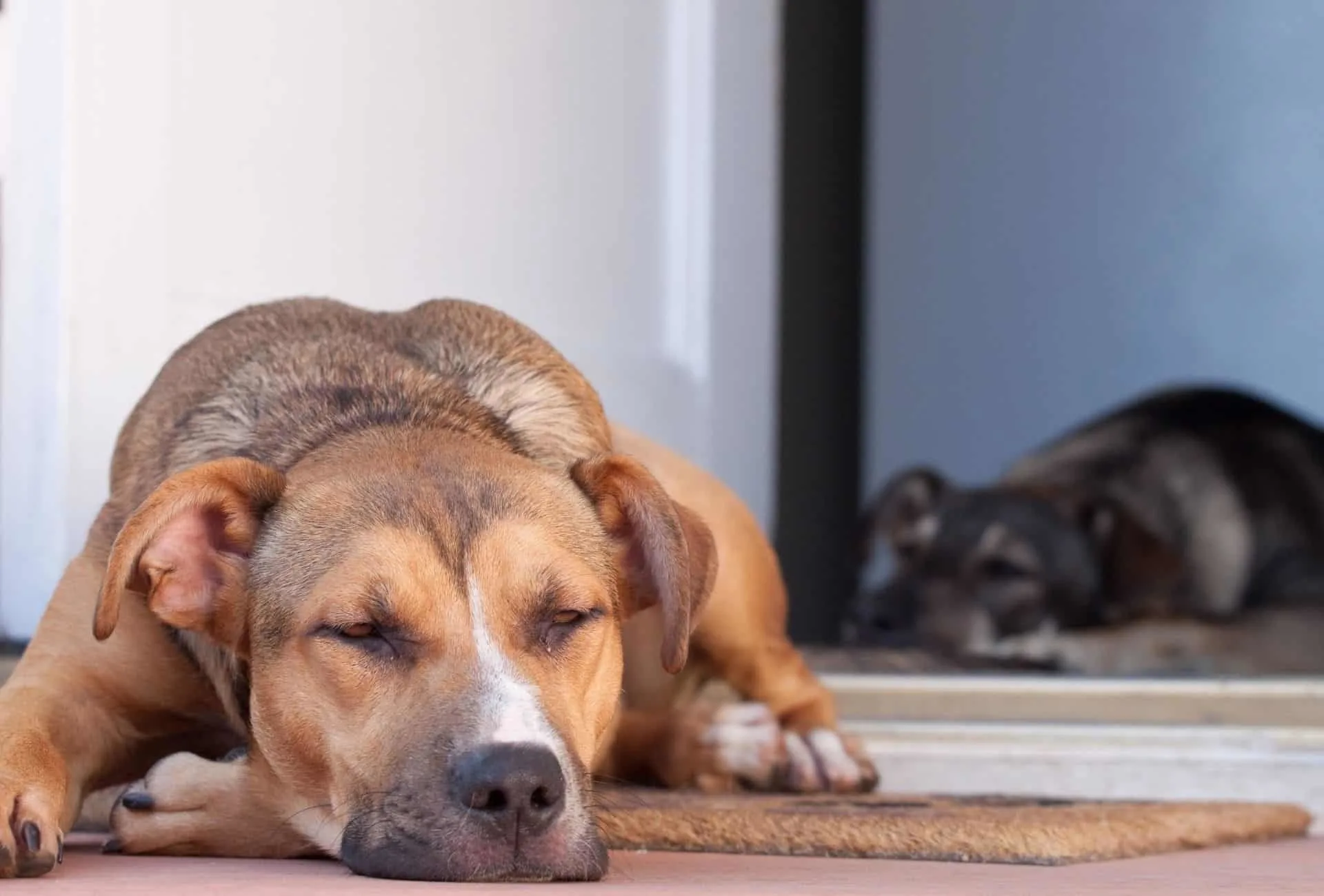Involuntary urine loss during sleeping is a result of urinary incontinence in dogs. This is a major problem for dog owners that always had a properly housetrained dog.
The housetrained canine suddenly starts losing control of the bladder and leaves a mess behind on the floor, or worse, the bed (hopefully not yours though).
Often, the term ‘incontinence’ is misused. Incontinence describes a situation when the dog passes urine while remaining completely unaware of the fact he is doing so.
Dogs that voluntarily pee on the kitchen floor can be suffering from some other condition or have some kind of behavioral problem. We’re not talking about the voluntary part.
Urinary incontinence can occur in dogs of all breeds and ages.
Middle-aged and older spayed females are more prone to developing the disease, but intact dogs can also be affected.
Although it’s a condition most prevalent among older dogs, it cannot be defined as an old-dogs disease only.
Some breeds such as English Sheepdogs, Dobermans, and Cocker Spaniels are predisposed to becoming incontinent, although the reasons for this remain unclear.
Incontinence in dogs can appear all of a sudden without any visible changes in behavior.
Luckily, most of the time, it will go away on its own before turning into a long-term problem.
However, if there is a concurrent medical problem involving the urinary tract, the symptoms can become more severe and the road to treatment a bit bumpier.
Your dog peeing in sleep can be the only symptom of a urinary tract problem.

Dogs with this condition may not show any other symptoms or discomfort when passing out urine during a walk.
Accompanying signs of a urinary tract disease and incontinence in a dog include:
- Wet floor patches and wet bedding (after the dog is sleeping)
- Wet and dirty hair on the hind legs and belly (especially long-haired breeds)
- Irritated and red skin in the areas constantly in contact with urine
- Licking of the genitalia
- Irritated genitalia
- The intense smell of urine in the whole house
Why Is My Dog Peeing In His Sleep?
If your dog pees in his sleep, he most likely suffers from urinary incontinence due to a urinary tract infection, bladder stones, kidney failure, hormonal disorders, injuries, tumors, or simply medication.
In more than 80% of cases of real incontinence, the problem results from the incompetence of the sphincter mechanism.
What it basically means is that the neck of the bladder is weak and cannot hold the urine inside.
Other causes of urinary incontinence in dogs include:
- Urinary Tract Infections
- Urinary struvites (stones)
- Acute kidney failure
- Hormonal disorders
- Injury or/and degeneration of spinal structures (common in German Shepherds)
- Tumors in the urinary tract
- Discus Hernia (protrusion of intervertebral disk)
- Anatomical abnormalities
- Congenital abnormalities
- Medications
Bacterial urinary tract infections in dogs are frequent and somewhat easy to diagnose.
In some cases, dogs with UTIs are feverish and have blood in their urine. Blood can also be seen when the underlying causes are tumors or urinary stones.
Hormonal disorders like diabetes mellitus, diabetes insipidus, or hyperadrenocorticism can lead to excessive urination and excessive thirst.
Primarily, this isn’t causing incontinence, but with time and no adequate therapy involuntary urine leakage can appear.
Acute kidney failure resembles the previous three symptomatically because of excessive urination and thirst (polyuria/polydipsia syndrome).
It’s a life-threatening condition that requires immediate veterinary assistance.

Ectopic ureter is the most common congenital abnormality that causes urinary incontinence in dogs.
Females show symptoms more often and it affects certain breeds more than others. More on that below.
Dog Leaking Urine All of a Sudden
Almost all cases of urinary incontinence appear all of a sudden, which also points toward your dog involuntarily losing control over urinating due to an underlying issue.
If your dog is mid-aged to older and starts leaking urine all of a sudden you should get him to the vet to get checked.
Discovering serious health abnormalities as the reason for the sudden leakage of urine can save your pet’s life.
Dog Urinating While Lying Down
Dogs often urinate while lying down due to their anatomy and it can be especially uncomfortable for your dog if that happens on his dog bed.
The overnight peeing episodes and the disrupted sphincter mechanism are related to the anatomical position of the bladder neck inside the pelvis of the dog.
When the dog lies down and goes to sleep there is a change in the internal pressure. Increased pressure makes the urine easily pass through the neck and leak out.
How to Stop Dog From Leaking Urine?
To stop your dog from leaking urine, your vet needs to pinpoint the cause and treat it with the appropriate medication which varies a lot from a simple mechanism failure to more complex medical issues requiring surgery.
You should rarely attempt to stop or treat dog urinary incontinence on your own. All dogs that have a problem with urine leakage should be checked by a veterinarian.
The treatment will depend solely on precise diagnosis and discovering the exact cause of incontinence.
Sphincter Mechanism issue
Sphincter mechanism incompetence can be conservatively treated with medications prescribed by the vet.
Phenylpropanolamine is an alpha-adrenoreceptors (a-a) stimulant that increases the urethral tone, thus narrowing the space where the urine leaks freely.
It can be given 2-3 times a day.
The medication is effective in about 80-90% of dogs with urinary incontinence due to incompetence of the sphincter mechanism.
To be fair, this study also found that 33% of the placebo group’s dogs got better.
Some side effects include mild behavioral changes and restlessness.
Dogs with renal diseases, cardiac diseases, and systemic hypertension shouldn’t be treated with Phenylpropanolamine.
Dogs put on therapy with this medication should have their systemic blood pressure measured one week and one month after the beginning to ensure there is no evidence of hypertension.
After a long period, the blood pressure can be measured two times a year.
Other less popular medications are estrogens (effective in 70% of cases) which control incontinence by increasing the sensitivity of the a-a receptors in the urethra and gonadotropin-releasing hormones (effective in 50% of cases) when the traditional therapy failed.
The most invasive type of treatment is with urethral bulking agents. These chemicals are injected into the surface of the organ once or twice.
It’s only used when medical therapy doesn’t improve the condition. It can also be used in combination with traditional therapy for increased effect.
Urinary Tract Infection
Urinary tract infections are treated with antibiotics and if needed with other supportive medications.
When the owner’s budget allows it, identifying the exact bacteria with a cultural sampling of urine is recommended to know which antibiotic to use.
Consult your vet if you have any questions regarding what to do if your dog pees while sleeping.
Urinary Tract Stones
Dog urinary tract stones come in different types, forms, and sizes.
They can be visualized with X-ray images or ultrasonography.
Depending on the type and size the treatment can consist of surgical removal, non-surgical removal with urohydropropulsion, or dissolution with medical food.
Kidney Failure
When a dog has acute kidney failure, he needs to be hospitalized immediately.
When the kidneys stop working, the toxins keep accumulating in the body which can have lethal effects.
Diabetes
Hormonal therapy is the treatment of choice for Diabetes mellitus and Diabetes insipidus (insulin and vasopressin).
Cushing’s Disease
Hyperadrenocorticism is a much more complex disease that requires special sets of treatments either surgically or with medications.
Ectopic Ureter
Males with ectopic ureters rarely show signs of incontinence.
Additionally, female Labrador Retrievers, Golden Retrievers, Soft-Coated Wheaten Terriers, and Siberian Huskies are more likely to suffer from this.
These episodes of urine leakage in dogs can be traced back to the time of weaning.
Because it starts when the dog is still a pup, owners often think of it as a behavioral problem that simply won’t go away.
Ectopic ureters often require surgical intervention.
The procedure consists of relocating the ureter entering the urethra to a new location on the bladder.
Unfortunately, the chances that the incontinence completely resolves in females is far lower than for males (25-70% compared to 70-80% for males).
In one study, ectopic ureters represented less than 10% of dogs with UTIs.
Dog Urinary Incontinence Natural Remedies
If you want to add supplemental treatment for your dog’s urinary incontinence or if traditional medications don’t provide the necessary effect, natural remedies include ground flax seeds, soy, corn silk, saw-palmetto, or the herb Sand Piao Xiao San.
Natural remedies can prove to be helpful only when the situation doesn’t require immediate medical treatment.
Ground flax seeds and soy can be purchased at most grocery stores and added to your dog’s diet.
They’re a great source of phytoestrogens that help in cases of incontinence as a result of hormonal imbalances.
Corn silk is a more powerful remedy because it provides more benefits. The mucilage inside the silk coats the outside of the bladder making it stronger.
Its anti-inflammatory properties can help in cases of urinary tract infections.
As with the previous two, corn silk also contains a fair amount of phytoestrogens.
You can purchase it in the form of powder or a pill. Using raw corn to make your own corn silk is also an option.
Saw-palmetto is primarily an anti-inflammatory herb that can help regain hormone balance.
It increases muscle tone and helps in bladder control support.
A similar effect is the Sand Piao Xiao San herbal remedy that holistic veterinarians often prescribe for incontinence in dogs.
Some dog owners found that improving a dog’s urinary incontinence can be achieved by turning to a grain-free diet in addition to medical therapy.
Although the exact mechanism isn’t known, many vets support this theory as well.
Difficult cases of urinary incontinence in dogs can benefit from acupuncture. The procedure stimulates the urinary the responsible urinary control neurons.
Dogs need 3 to 5 treatments to regain control.
Can Dogs Have Nightmares and Pee?
As a matter of fact yes, dogs can have bad dreams and pee in their sleep because of them.
However, this can only happen a few times and it’s not a long-term problem. Consider it an accident.
